SHIRLEY MULDOWNEY: THE PIONEERING WINS
Shirley Muldowney enjoyed becoming the first woman to win a professional national event so much that she did it twice.
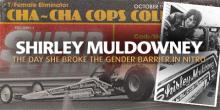
She might have won an IHRA national event in 1971, but it was her triumph on June 13, 1976, during the NHRA Springnationals in Columbus, Ohio, that put a female drag racer into the spotlight of a gender-competitive society.
Ms. Muldowney won four world championships during a career of legendary proportions, but it was that one summer day in Columbus that made her a legend before she ever carried the No. 1 designation on the side of her pink dragsters.
To her, that day had nothing to do with being a female and taking home the trophy. It had everything to do with being a viciously competitive drag racer wanting to score her first national event victory.
“I never looked at it as making history,” Muldowney told CompetitionPlus.com in an exclusive interview. “I never looked at it as [the] first woman to do this or first woman to do that. Even though I was a lady driver, I wore a skirt during the week. That [being a lady] meant something to me.
Shirley Muldowney enjoyed becoming the first woman to win a professional national event so much that she did it twice.
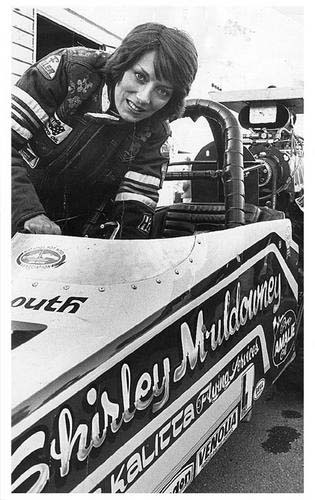
She might have won an IHRA national event in 1971, but it was her triumph on June 13, 1976, during the NHRA Springnationals in Columbus, Ohio, that put a female drag racer into the spotlight of a gender-competitive society.
Ms. Muldowney won four world championships during a career of legendary proportions, but it was that one summer day in Columbus that made her a legend before she ever carried the No. 1 designation on the side of her pink dragsters.
To her, that day had nothing to do with being a female and taking home the trophy. It had everything to do with being a viciously competitive drag racer wanting to score her first national event victory.
“I never looked at it as making history,” Muldowney told CompetitionPlus.com in an exclusive interview. “I never looked at it as [the] first woman to do this or first woman to do that. Even though I was a lady driver, I wore a skirt during the week. That [being a lady] meant something to me.
“Winning because I was a woman was never the motivation. I wanted to win because I knew what it felt like to be runner-up.”
When the opportunity presented itself, she clearly left no doubt of her worthiness. She made it awful hard for a male-dominated media and sport to discount her feat.
There’s just something about scoring low elapsed time in every round of competition and a track record as a parting shot that tends to erase the potential of downplaying an accomplishment.
That’s exactly what Muldowney did.
That was a day that everyone all of a sudden wanted to be around Shirley. I made a lot of friends after they saw that I was able to hang in there. They saw where I was able to take it on the chin and come back from the adversity of the fire
a d v e r t i s e m e n t
Click to visit our sponsor's website
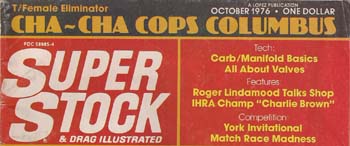
The memories of the Columbus final round are ingrained in her mind, as she recalled the mechanical woes that beset her opponent during the final round. Super Stock & Drag Illustrated, the leading monthly drag racing magazine of the era, reported that Edwards had oil pressure issues following the burnout.
Muldowney could have easily misconstrued the moment as just one of the many times a sexist driver played starting line games with her. This time was different, Muldowney noted, and it was her experience as a nitro racer that enabled her to draw the conclusion.
If Muldowney regrets anything from that day, it’s that she never got the opportunity to meet Edwards, and if she did the introduction was brief.
“I never knew the guy personally and we may have even said hello in passing,” Muldowney admitted. “I remember seeing out of the corner of my eye him motioning his crew member [on the starting line, staging] to, ‘get the hell out of the way.”
“I was really proud of him for that because sometimes the driver had to take control of the errant crewmembers on the starting line,” Muldowney added.
That’s the kind of driver Muldowney always prided herself in being – one in control. That’s why she always took it personal when anyone would question her driving abilities.
It’s hard to say whether she wanted to win the 1976 event more because she knew how bad it felt to lose a final, as she referenced earlier, or if it was just to silence the chauvinistic pigs who said her final round loss and subsequent jaunt into the catch net, one year earlier at the same track, was the result of her shortcomings as a non-male driver.
She might say one thing, but the look in her eyes as she conveys the words of her skeptics, clearly tell another story.
“I did what I was supposed to do,” Muldowney said.
a d v e r t i s e m e n t
Click to visit our sponsor's website

People were second guessing her at that moment, going as far as to suggest she was overly excited just to be in the final round that she forgot to pull the parachute against eventual winner Marvin Graham.
“I forgot what idiot said that,” Muldowney said. “But before that [final] round there were so many people jumping in and helping, people going where they had no business going and adjusting things they had no business adjusting.
“My parachute levers were always mounted between my legs at the base of the seat. That was the case from the first car I ever drove to the last, I never changed it. Someone went in, tightened the unit to the point it wouldn’t move. I couldn’t pull the levers.”
She was uninjured in the top end mishap.
“I got blamed for that one for a long time,” Muldowney quipped. “Anyway they could degrade my ability or effort, they would do it.”
A year later, that talk was a thing of the past. Her subsequent runner-up finish at Indy three races later gave reason to dispel the negative energy.
A massive Columbus semi-final fireball in a semi-final win over Jade Grenade dragster pilot Ted Wolf, showed not only the resolve of the crew, but Muldowney, a driver who was gender different but just as determined, if not more than her male counterparts.
That race made the drivers, officials and race fans view her in a different light, at least for that day or season. This much-maligned driver showed her resolve as a champion.
Muldowney showed the same true grit before; it just took that day for her competition to accept it.
“That was a day that everyone all of a sudden wanted to be around Shirley,” she recalled. “I made a lot of friends after they saw that I was able to hang in there. They saw where I was able to take it on the chin and come back from the adversity of the fire.”
Muldowney smiles when she recalls the reaction of the then NHRA Division 3 director Bob Daniels. Of the seven NHRA divisional directors employed by the NHRA, Daniels left no doubt that he was proudest the monumental accomplishment had happened on his watch.
“He had tears in his eyes,” Muldowney recalled. “He rode me back up the track. He didn’t leave my side. He was as proud as he could be because we did it in his division.”
But few could have been prouder that her mother, Mae Roque, whose first race she ever attended just happened to be that weekend in Columbus.
“For my mom to be there and see that light come on,” she added, and paused, never finishing the sentence.
a d v e r t i s e m e n t
Click to visit our sponsor's website
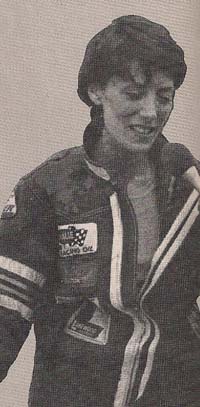
“My mother was shy when the waiter came around to take our orders,” Muldowney recalled. “Instead of ordering the steak or something nice, she ordered the spaghetti.”
Evidently the kitchen hadn’t heard that Muldowney had won.
“They brought her cold spaghetti with ketchup on it,” she said.
One of the dining racers became so incensed when he saw the spaghetti that he grabbed her plate, marched into the kitchen and wouldn’t leave until Shirley’s mother had a properly prepared meal.
That was a good sign for Muldowney. A sign that she had arrived and those along with her were along for the ride, especially the one responsible for bringing her into the world.
Of the ten female professional NHRA national event winners and four others in the IHRA since, Muldowney believes she was the perfect person to get that first victory. Drag racing needed a female who could slug it out with the chauvinistic men, hold her own, and when the racing was over still have the feminine spirit to apply make-up and wear the nice dresses.
“Absolutely,” Muldowney admitted. “I’m glad it was me. If the whole thing hadn’t been me, it wouldn’t have happened the way it happened because I don’t think it could have happened at that time. Maybe I had to tell them [her antagonists] the way it is. Maybe I had to chase them down and turn them around and confront them to their face. I had to or I wouldn’t have survived.
“They tended to always talk behind my back. It always filtered back to me. Some of the things were not just disrespectful or mean; they were downright cruel. It was so rewarding that I survived it.”
a d v e r t i s e m e n t
Click to visit our sponsor's website
Muldowney has set back over the past thirty-eight years since she first became a professional drag racer, and she’s seen the female drivers come and go. Some of them she respects and others she wouldn’t give a counterfeit penny for.
“I have yet to see that spark and I know what it looks like because it was part of me,” Muldowney added. “There are some who say they admire me and they do that because it’s the politically correct thing to do.”
Muldowney interjects the one female driver that has come close to having that spark is the one driver that many think she liked the least.
Lucille Lee had that spark, Muldowney contends.
In their first head-to-head match, Lee defeated Muldowney and earned the accolades that accompanied beating such a legend. Knowing what she had to do to get that first win, much less a world championship, Muldowney took offense to the fanfare that accompanied Lee’s monumental victory.
“I was a little ticked when she won Bakersfield against me and did so only because we had a clutch malfunction,” Muldowney explained. “Then I got the next issue of National DRAGSTER and she was on the cover. I have since come to understand that publications go with the moment. History isn’t always what they pay attention to.”
Muldowney wasn’t upset that Lee had gotten recognized over the victory, that particular issue of the NHRA’s house organ was the NHRA Gatornationals souvenir issue, a race that she was the defending champion for.
That’s where the misunderstandings first transpired and led to other mini-skirmishes along the way. When they had time together, Muldowney left with a different opinion of her perceived nemesis.
Lee’s victory at the 1982 NHRA Southern Nationals in Commerce, Ga., represented only the second female professional national event in NHRA history. There have been 76 total victories amongst female professional drivers and riders since.
“I think in the personal conversations afterwards with her,” Muldowney said of Lee, who passed after a lengthy illness in 2003. “I got to know a lot about the person she was. She was the most respectful of any woman who came and went in drag racing.”
Muldowney is adamant she never had a problem with the sport entertaining other female professional drivers; her issue was that many took for granted what she had to endure for their moment.
“I certainly believe they had a lot of doors opened for them and a lot of heat taken off of them that I didn’t have the same luxury,” Muldowney said. “I’m not going to say I was at the right place at the right time but it was the way it all went down. Truthfully I think everyone has their own style.
“I had my own style; fortunately it was the right style for the moment.”
VIDEO FLASHBACK -
ROCKINGHAM 1971 - THE REAL FIRST WIN
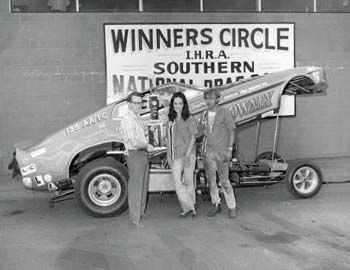 sentence.
sentence. Muldowney was named as the NHRA’s fifth-ranked all-time drag racer and Jadauga was on the selection panel.
An observant Jadauga penned the following line to go along with his vote, “Her pioneering efforts for women could be compared to the racial barriers that Jackie Robinson broke in major league baseball.”
Five years before Muldowney won her first event during the 1976 NHRA Springnationals in Columbus, Ohio, the unbreakable driver had already claimed a national event victory behind the wheel of a nitro-burning Funny Car.
Muldowney drove a “tired” ex-Connie Kalitta Mustang Funny Car to the 1971 IHRA Southern Nationals title on a fall afternoon in Rockingham, N.C.
She will tell you that it was a hard-fought victory, one that was probably tougher than the triumph she gets the most credit for a half-decade later.
“That car was a crude piece of iron, that could have killed you any day of the week,” Muldowney revealed.
Because the IHRA was in their first season, and racing outside of the NHRA sanction went largely unrecognized, the NHRA never recognized her feat as one worth noting.
“Few people are aware of that one,” Muldowney mused. “They just don’t read the facts. We had to race and beat a lot of cars that weekend.”
Muldowney raced the likes of Jungle Jim Liberman, Pee Wee Wallace, and Connie Kalitta on the way to making history.
“That was a tough road,” Muldowney continued. “You have some cars that ran as many as four times a week. They were down and dirty drivers and both good and bad.”
“I did have my fans who mentally kept me going. Even Connie would stick up for me and physically go after people who would verbally abuse me.
“Those were days that I wouldn’t trade for anything,” Muldowney said. “They were great memories.”
Both of her first wins are memories she will cherish. (Photo by Jon Asher)
ANOTHER VIDEO FLASHBACK - SHIRLEY AND THE FUNNY CAR
| {loadposition feedback} |






